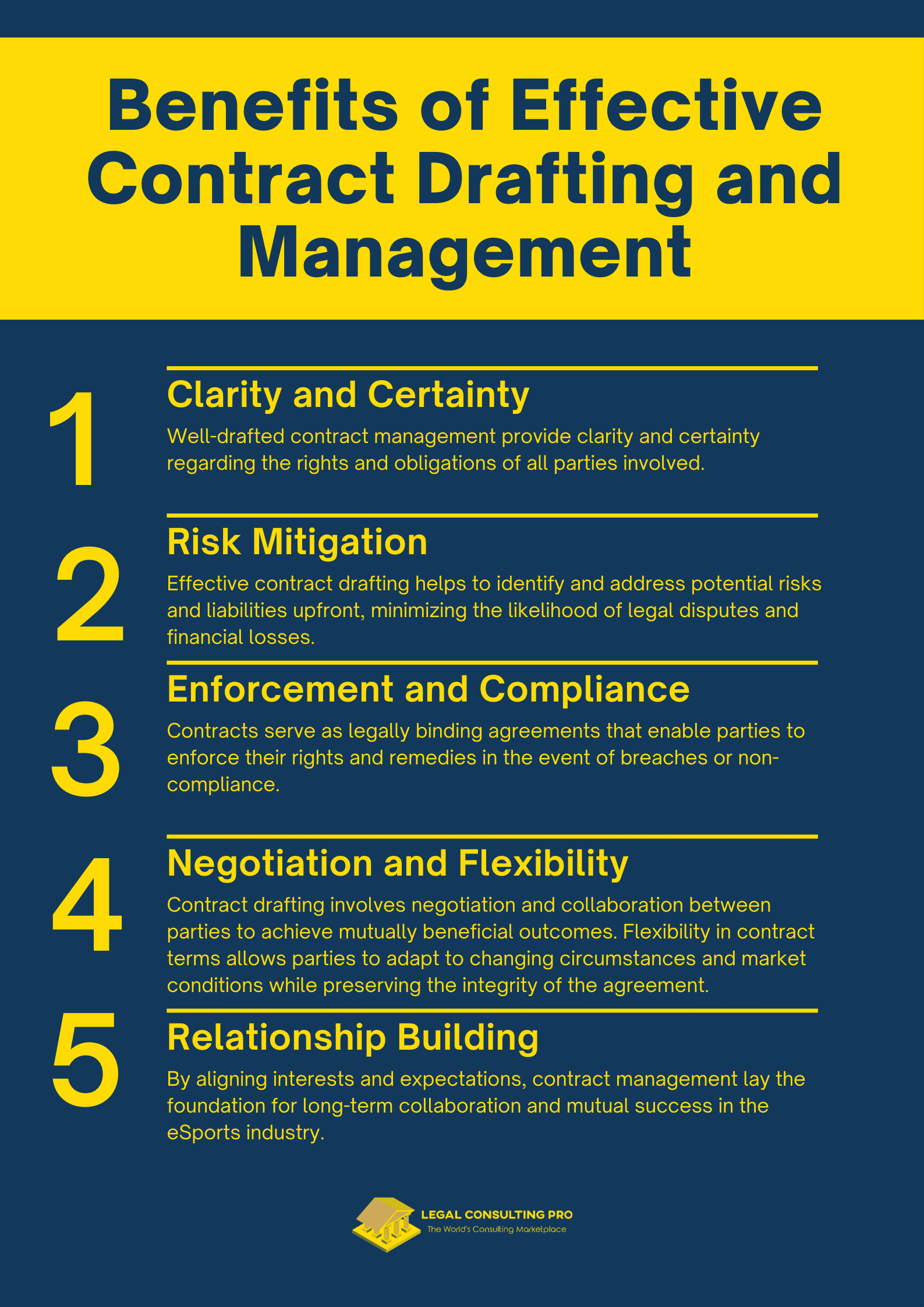In recent years, the eSports industry has experienced exponential growth, transforming competitive gaming into a lucrative global phenomenon. With the increasing commercialization of eSports events and tournaments, the need for robust contract management practices has become paramount. eSports contract management play a vital role in establishing rights, obligations, and expectations between players, teams, sponsors, and event organizers. This article explores the importance of effective contract drafting and management in the eSports industry and how it helps to level the playing field for both players and sponsors.
Understanding eSports Contracts
eSports contracts are crucial legal documents that govern various aspects of the rapidly growing eSports industry. These agreements cover a broad spectrum of relationships within the eSports ecosystem, ranging from player-team engagements to sponsorship deals and broadcasting rights agreements.
Player contract management outlines the terms and conditions of a player’s participation with a team, including salary, bonuses, obligations, and rights. Team agreements establish the relationship between eSports organizations and their players, defining responsibilities, revenue sharing, and branding rights. Sponsorship deals detail the terms of partnership between eSports teams or players and sponsors, including financial support, promotional activities, and branding opportunities. Broadcasting rights agreements govern the distribution and broadcasting of eSports events, including streaming rights, exclusivity clauses, and revenue-sharing arrangements.
Tournament participation agreements outline the terms and conditions for teams or players to participate in eSports tournaments, including entry fees, prize distribution, and code of conduct. These contracts are essential for clarifying legal obligations, protecting intellectual property rights, and ensuring fair and transparent relationships within the eSports industry.
Player Contracts:
- Player contract management outlines the terms and conditions of engagement between professional gamers and eSports organizations or teams. These contracts typically cover aspects such as player salaries, tournament winnings, sponsorship obligations, image rights, and non-compete clauses.
- Effective drafting of player contracts requires careful consideration of the player’s rights, including fair compensation, intellectual property ownership, and contractual obligations. Clear and transparent communication is essential to avoid misunderstandings and disputes down the line.
Sponsorship Agreements:
- Sponsorship agreements are crucial for eSports organizations and teams to secure financial support and brand partnerships. These contract management define the sponsorship terms, including the sponsorship fee, brand visibility, promotional activities, and exclusivity rights.
- Contract drafting in sponsorship agreements involves negotiating favorable terms for both parties while ensuring that the sponsor’s brand is effectively represented and promoted within the eSports community.
Broadcasting Rights Agreements:
- Broadcasting rights agreements govern the distribution and broadcast of eSports tournaments and events across various media platforms, including streaming services, television networks, and online channels. These contracts stipulate the rights, fees, and territorial restrictions associated with broadcasting rights.
- Careful drafting of broadcasting rights agreements is essential to maximize revenue opportunities for tournament organizers while ensuring widespread coverage and accessibility for eSports fans worldwide.
Benefits of Effective Contract Drafting and Management
Clarity and Certainty:
Well-drafted contract management provides clarity and certainty regarding the rights and obligations of all parties involved. Clear language and precise wording help to avoid misunderstandings and disputes, fostering trust and cooperation among stakeholders.
Risk Mitigation:
Effective contract management helps to identify and address potential risks and liabilities upfront, minimizing the likelihood of legal disputes and financial losses. Provisions such as indemnification clauses, limitation of liability, and dispute resolution mechanisms can help protect parties from unforeseen circumstances.
Enforcement and Compliance:
Contracts serve as legally binding agreements that enable parties to enforce their rights and remedies in the event of breaches or non-compliance. By establishing clear performance metrics, timelines, and deliverables, contract management helps to ensure accountability and adherence to contractual obligations.
Negotiation and Flexibility:
Contract drafting involves negotiation and collaboration between parties to achieve mutually beneficial outcomes. Flexibility in contract terms allows parties to adapt to changing circumstances and market conditions while preserving the integrity of the agreement.
Relationship Building:
Successful drafting of contracts fosters positive relationships and partnerships between players, teams, sponsors, and event organizers. By aligning interests and expectations, contract management lays the foundation for long-term collaboration and mutual success in the eSports industry.

Challenges and Considerations in eSports Contract Drafting
Regulatory Complexity:
The global nature of the eSports industry presents challenges in navigating diverse legal frameworks and regulatory requirements across different jurisdictions. Contract drafting must account for applicable laws, tax implications, and regulatory compliance to avoid legal pitfalls.
Intellectual Property Rights:
Intellectual property (IP) rights, including copyrights, trademarks, and image rights, play a central role in eSports contract management. Contract drafting should address IP ownership, licensing arrangements, and usage rights to protect the interests of all parties involved.
Talent Retention and Recruitment:
Talent retention and recruitment are critical for eSports organizations to maintain competitive rosters and attract top-tier players. Contract drafting should incorporate provisions for player incentives, performance bonuses, and career development opportunities to incentivize talent retention and loyalty.
Data Privacy and Security:
Data privacy and security concerns are paramount in the eSports industry, given the collection and processing of personal and gaming-related data. Contract drafting should include provisions for data protection, confidentiality, and cybersecurity measures to safeguard sensitive information and comply with privacy regulations.
Conclusion
Effective contract management is essential for leveling the playing field and promoting transparency, fairness, and accountability in the eSports industry. By negotiating and drafting contracts that address the rights, obligations, and expectations of all parties involved, players, teams, sponsors, and event organizers can build strong and mutually beneficial relationships. As the eSports industry continues to evolve, the importance of sound contract practices will remain central to its sustainable growth and success.
Similar blogs:
6 Best Practices for Industry-Specific Contract Drafting: Insights from Expert Lawyers
Cannabis Contract Drafting: Navigating the Legal Maze of a Budding Industry







































